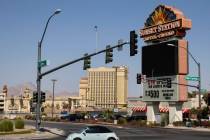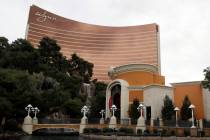MGM’s $800 million Massachusetts casino plan to get final public hearing
SPRINGFIELD, Mass. — After more than two years of competition, the last resort-casino proposal remaining for western Massachusetts is in Springfield, a former manufacturing hub where an $800 million project straddling its downtown and South End neighborhoods represents the city’s biggest economic development undertaking in a generation.
The proposal by MGM Resorts International, which owns the Mirage, Bellagio, MGM Grand and other casinos, was approved by city voters last July and has advanced further than four others in the race for the state’s sole western region casino license. Plans by Penn National Gaming and Ameristar Casinos never went before Springfield voters, while plans by Mohegan Sun in Palmer and Hard Rock International in West Springfield were defeated in local referendums.
The Massachusetts Gaming Commission is holding a final public hearing on the project Wednesday in Springfield ahead of a possible June decision.
“If casinos are going to come, I’d rather see them come to Springfield,” said David Glantz, who owns a Main Street smoke shop a block from the proposed casino site and across from a vacant lot where an office building had to be razed after a tornado. “I’d like to see this city get back to what it used to be, with economically viable people willing to spend money every day.”
The gambling commission, created by the state’s 2011 casino law, will award licenses to at least three casino projects in Massachusetts. It has already granted Penn National Gaming the sole slot parlor license for a project at the Plainridge harness race track in Plainville.
Jeffrey Ciuffreda, president of the Affiliated Chambers of Commerce of Greater Springfield, says the MGM project will be a boon to the regional economy.
He points to the minimum $50 million in goods and services the casino pledges to buy each year from local companies, to local spending from the project’s 2,000 temporary construction workers and its projected 3,000 permanent casino employees — 35 percent to be hired from among city residents.
The new casino could also bolster Springfield city government, which had been on the verge of bankruptcy in 2003 and emerged from state control in 2009. Under its host community agreement, MGM will pay Springfield $15 million in up-front and advance payments and another $25 million annually once the casino opens. The casino has also reached agreements with eight other surrounding communities totaling about $2 million upfront and about $1.5 million annually.
Still, not all area residents are convinced of the casino’s economic potential.
Al Cabot, who helped lead the successful campaign to defeat Hard Rock’s casino proposal in neighboring West Springfield, suggests the casino would draw largely from western Massachusetts’s poor and working class residents.
“I don’t know of an example in the country where an urban environment has been revitalized by the introduction of a casino,” Cabot said. “There are four casinos in Detroit. But Detroit doesn’t seem to be prospering.”
Cabot and other anti-casino advocates are seeking a November ballot referendum asking voters if they want to repeal the state’ casino law altogether and effectively scuttle projects like MGM’s. The decision now rests with the state’s supreme court.
Some downtown businesses are also anxious about their future.
“We have to relocate whether we want to or not, but we’ve been totally blind as to what’s really going on,” said Kenneth Elsner, who owns O-Mi Oriental Grocery, which is among a dozen or so downtown businesses that would have to be relocated — likely with compensation — to make way for the casino project. “The situation has really tied our hands. You can’t run a business this way.”




























